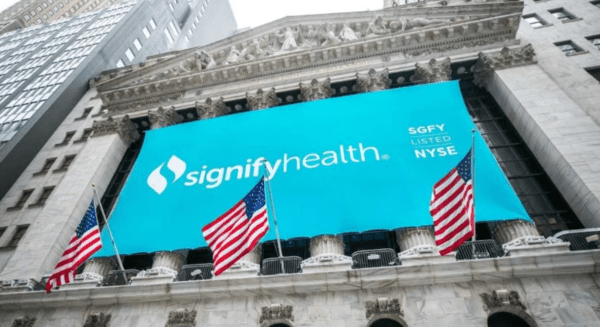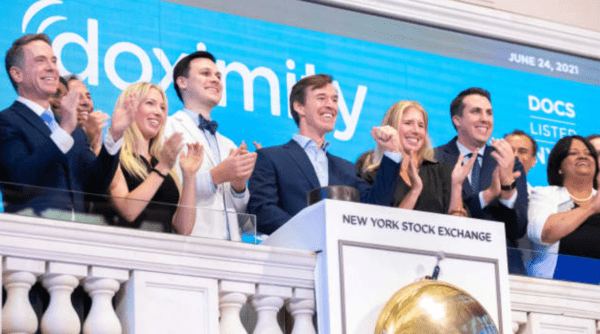|
Signify Acquires Caravan | Doximity Scheduling
February 13, 2022
|
|
|

|
|
Together with
|

|
|
|
“If you’re truly doing primary care well, you should be willing to absolutely go at risk and take full accountability for all of the patient’s costs of care.”
|
|
Andreessen Horowitz General Partner Julie Yoo in a conversation with STAT.
|
|

|
|
Signify Health is celebrating the one year anniversary of its IPO with style. The value-based care platform is acquiring Caravan Health for a lofty total of $250M, with another $50M set aside for future performance incentives.
Upon closing, Signify will have one of the largest networks of providers engaged in risk-based contracts in the US, reaching over 3,200 health systems and covering more than 500k lives.
- Signify’s technology platform and nationwide physician network help payors and providers develop value-based care programs and shift health services to the home.
- Caravan enables accountable care organizations (ACOs) to excel in population health management and commercial risk arrangements, focusing primarily on medically underserved patients.
- Signify’s mobile physician network and at-home services are well-positioned to assist Caravan’s ACO partners with improving access to care by extending the resources of local care teams.
Why It Makes Sense
Combining Caravan’s population-level insights with Signify’s at-home services creates an “end-to-end suite” of value-based care enablement, allowing organizations to manage larger populations while improving care coordination beyond traditional clinical environments.
To top it off, Signify can also leverage its payor relationships and post-acquisition scale to improve provider participation in value-based care programs by increasing the percentage of patients in a provider’s panel that are covered by the arrangements.
|




|
|

|
|
Healthcare networking platform Doximity is expanding beyond its role as “the LinkedIn for doctors” with the announcement that it is acquiring on-call physician scheduling app Amion for $53.5M.
- Amion adds a key component to Doximity’s physician cloud services by integrating scheduling into its existing suite of messaging, referral, and telehealth tools.
- Doximity has over a million doctors as verified members, ranking it among the largest networks of healthcare professionals in the US.
- The company went public last year at a valuation of $7B and has since found success with its strategy of cultivating a community of medical workers that it can then offer tools to in order to improve their day-to-day workflows.
- In its recent conference call with investors, Doximity revealed that its revenue climbed 67% year-over-year to $97.9M, netting a healthy pre-tax earnings of $47M.
The Takeaway
Doximity CEO Jeff Tangney stated that the Amion move was primarily a product acquisition for the company, adding a valuable subscription business that manages over 200k physician schedules across thousands of hospitals.
By expanding Doximity’s roster of collaboration products, Amion’s scheduling tools have the potential to improve engagement across its acquirer’s entire network.
|




|
|
Explore Nuance’s Personalized Patient Experience
Personalized digital experiences drive better outcomes for patients and providers. Explore how Nuance is using AI automation to advance the quality of service across the care journey here.
|
|
- Health Sites Secretly Track Visitors: New research from Duke University found that health sites frequently use third-party ad-tracking tools to gather personal information from visitors, without revealing the extent of the data collection in their privacy policies. Researchers analyzed “Off Facebook Activity” data for a panel of Facebook users to investigate the prevalence of non-disclosed data collection for cross-site tracking, finding that several genomics companies gathered and shared personal user information despite not having any clear language informing users of the process, especially troubling given genomic data’s potential to expose people’s health status.
- Thirty Madison + Nurx: Direct-to-consumer telehealth company Thirty Madison is merging with Nurx, a female-focused virtual care startup that supports more than 750k patients with needs such as contraception and chronic condition management. The merger doubles both the number of conditions Thirty Madison covers and the number of patients on its platform, which houses the company’s specialized sub-brands such as Keeps and Cove.
- Transparency Non-Compliance: A new survey of over 1k hospitals from PatientRightsAdvocate.org found that only 14% of hospitals currently comply with the federal cost of care transparency rule that took effect at the beginning of 2021. The most common act of noncompliance was lacking or incomplete posting of negotiated rates for service items from accepted health plans, but it’s hard to predict that the situation will improve quickly given that the cost of compliance with the rule is $12k per hospital.
- Anthem Expands Virtual Primary Care: Anthem announced that it is rolling out its new virtual primary care plan to eligible members of its commercial health plans in 11 states: Colorado, Connecticut, Georgia, Indiana, Kentucky, Missouri, Nevada, New York, Ohio, Virginia and Wisconsin. The services will be available through the payor’s Sydney Health app, giving patients access to 24/7 medical text chats, video visits, and proactive future care guidance.
- Expressable Series A: Expressable recently raised a $15M Series A round (total funding now $19.5M) to expand access to its virtual speech therapy solution. The company’s platform combines one-on-one video visits with custom learning modules that allow families and providers to track patient progress, a model that now requires Expressable to hire additional speech-language pathologists to keep up with demand.
- Prescription Accountability: Physicians prescribe fewer opioids after implementing an ePrescribing program, according to a recent study published in The Journal of Hand Surgery Global Online. Researchers evaluated physician prescribing patterns for 428 hand surgery patients, finding that the percentage of patients that received an opioid prescription following carpal tunnel release procedures fell from 51% to 30% after implementation of the ePrescribing policy. The study authors attribute the declines to increased transparency leading to more physician accountability.
- Ada Funding: European patient triage company Ada Health added another $30M to its Series B funding round that was initially led by Bayer nearly 9 months ago, bringing the total raise to $120M. Ada’s AI-enabled symptom checker and care navigation platform currently has 11M registered users worldwide, and the funding will be used to accelerate growth in the US “following strong traction in the region.”
- mHealth App Usage: The University of Michigan’s National Poll on Healthy Aging found that nearly three in ten of adults age 50-80 currently use at least one mobile health app, with 34% reporting that they use or have used apps for exercise, 22% for nutrition, 20% for weight loss, and 17% for sleep. The survey found that half of the 2,110 respondents would be interested in tracking blood sugar or medication with an app but currently do not, suggesting that app developers could do more to target these solutions at older populations.
- Cancer Moonshot: The Biden administration “reignited” the US’ Cancer Moonshot initiative, setting a goal to halve the country’s age-adjusted cancer death rate within the next 25 years. Although the initiative has its fair share of critics, who argue that cutting cancer deaths by 50% would require “curing” cancer (not just catching and treating it), it also means that more government resources could be on the way for newly added focus areas such as blood tests, vaccines, and overcoming the pandemic’s screening backlog.
- Hybrid Care Satisfaction: A recent Mayo Clinic survey found that patient reported satisfaction exceeded 90% for its Hybrid Care Hotel, a post-surgery facility that allows follow up appointments to be conducted remotely to reduce hospital stays. An impressive 94% of patients were likely to recommend the program to others, pointing to reasons such as seamless transitions of care and a lower burden for family members.
|
|
|
|
|